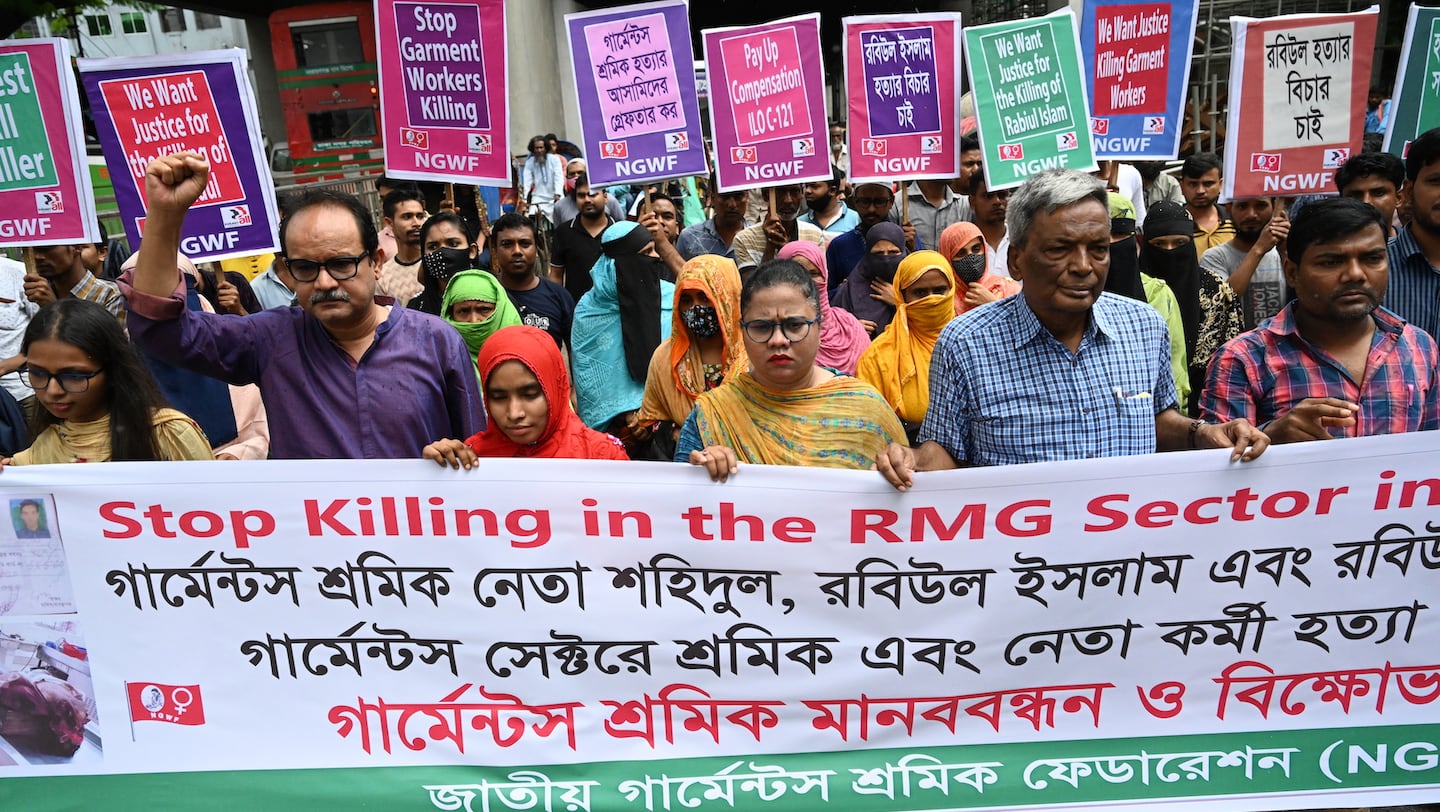
The Business of Fashion
Agenda-setting intelligence, analysis and advice for the global fashion community.

Agenda-setting intelligence, analysis and advice for the global fashion community.

Early in the evening of June 25, Bangladeshi union leader Shahidul Islam paid a visit to a factory in the garment industry hub of Gazipur on the outskirts of Dhaka. His goal was to settle a dispute over unpaid wages at one of the local clothing factories, a common issue in fashion’s global supply chain. He never made it home.
After leaving the factory, Islam was set upon by a group of men, according to a translation of a police complaint filed by his union and reviewed by BoF. As they beat him unconscious, the men jibed at Islam over his efforts to secure the workers’ pay, the complaint alleged. He died in hospital later that night.
The incident is currently under police investigation and several people have been arrested. Still, the death has heightened anxiety over the risks faced by labour organisers amid a broader, and often violent, crackdown on labour rights.
The pandemic has left many of fashion’s manufacturing hubs with a nasty economic hangover, made worse by the last few years of inflation and gyrating demand. The resulting uncertainty has fuelled a shift to greater authoritarianism and more precarious work in many supplier countries, creating a crucible for widespread union busting and labour abuse, workers’ rights groups say.
ADVERTISEMENT
“What happened to Shahidul Islam was shocking, but not actually that surprising,” said Monika Hartsel, deputy country programme director for Bangladesh at worker rights advocacy group Solidarity Centre.
Organising a union in Bangladesh has never been easy, said Kalpona Akter, executive director of the Bangladesh Centre for Workers Solidarity, the union where Islam worked. When she started organising, Akter was fired and blacklisted. In her three decades as a union leader, she said she’s spent a month in jail and faced numerous criminal charges. Islam is the second of her colleagues to be killed.
Things have gotten worse since the pandemic, according to Akter. “Our phones are tapped, government security agents come to our office, they come and sit down in our trainings,” she said. While beatings are common, the death of Islam, a local union leader, has ratcheted up the tension another notch, labour advocates say.
“There is a real climate of fear that has been created since Shahidul’s murder,” said Hartsel. “Things that have been happening for a long time are much more threatening.”
The Bangladesh Garment Manufacturers and Exporters Association, a private organisation which represents factory owners in the country, said it has not received any specific complaints from union organisers about being blacklisted, arrested or subjected to surveillance, but said it had mechanisms in place to help resolve disputes and grievances should they arise. The organisation has condemned Islam’s death and called for a comprehensive investigation.
Across garment manufacturing hubs, dozens of union activists and labour advocates have reported an increase in intimidation, discrimination, threats and harassment since the pandemic began, according to an October survey by the non-profit human rights monitoring group Business and Human Rights Resource Centre. A fifth of respondents, which included more than 100 union activists and labour advocates in Bangladesh, Cambodia, Indonesia and Sri Lanka, said arbitrary arrests and false charges linked to trade union activities have grown.
In Myanmar, where a military coup in 2021 plunged the country into a political and humanitarian crisis, the situation is particularly stark. Dozens of union activists have been arrested and killed for campaigning for a return to democracy, according to labour rights groups. In a report released last month, BHRRC documented hundreds of allegations of abuse at factories supplying major Western brands.
While Myanmar is an extreme case, in other major apparel-producing countries, including India and Sri Lanka, governments have made moves to weaken laws protecting workers. Economic uncertainty is adding another layer of pressure and risk for workers who might consider organising.
ADVERTISEMENT
“There’s like a bad storm brewing,” said Christina Hajagos-Clausen, director for the textile and garment industry at the IndustriALL Global Union. “There’s still all this uncertainty in the supply chain and there’s inflation… [and] when there’s a global economic downturn in general companies are more hostile to labour unions.”
Jahanara Begum hasn’t felt safe at home in over a month, not since two colleagues at the union she works with in Bangladesh were arrested and another hospitalised, she said.
Like Islam, they had been seeking to address a dispute over unpaid wages at a group of factories owned by manufacturing conglomerate Chaity Group, a supplier to brands including H&M and British retailer Next. Instead, management moved to close the factories down, according to union complaints filed with Bangladesh’s Department of Inspection for Factories and Establishments and reviewed by BoF.
Neither Chaity Group nor DIFE responded to requests for comment. The BGMEA said Chaity Group was not involved in the arrests and attack. The factories were closed as a result of persistent strikes “without any lawful demands,” which have resulted in significant financial losses over the last four years, the manufacturers’ association said. Workers will receive notice pay and benefits in the coming months, it added.
After the arrests, Begum didn’t go home for a week for fear she would be taken into custody. But she continued to campaign to reopen the factories and secure unpaid wages. She said she still gets regular calls from the authorities asking where she is and moves frequently to stay secure.
“It’s harassment,” said Begum, speaking with the help of a translator during a video call late one evening last month after a day picketing outside the factories. “I don’t feel safe anymore.”
The ongoing erosion of fragile labour rights in many countries creates a growing challenge for fashion brands, whose commitments to ethical sourcing are also coming under mounting regulatory scrutiny.
Though brands don’t typically own the factories where their garments are produced, a growing number of jurisdictions are looking to introduce rules that would create some accountability for abuses that occur in big companies’ supply chains.
ADVERTISEMENT
Brands including H&M Group and Zara-owner Inditex have announced plans to withdraw from Myanmar, where labour groups have said the political situation makes it impossible for companies to credibly ensure labour standards are upheld.
Following Islam’s murder in July, fashion industry trade group the American Apparel and Footwear Association wrote to the Bangladeshi government to highlight concerns about growing attacks against unions and labour activists in the country.
But more broadly brands’ existing initiatives have done little to stem the suppression of labour rights, already an issue before the pandemic began, advocacy groups said. Even as fashion companies have stepped up their commitments to operate responsibly, growing demand for faster-paced, more flexible and low cost production has created a conflicting pressure. Squeezed factories still often offer prices below the cost of production, according to manufacturers and advocacy groups.
“In theory factories that produce apparel for well-known brands and retailers represent a protected space; things should be better,” said Scott Nova, executive director of the Worker Rights Consortium. “Why isn’t that happening?... If brands’ and retailers’ codes of conduct mean anything, it should be.”
The factory where Begum works, Ashique Dress Design is listed as a supplier to H&M Group and British retailer Next. It was formerly part of the International Labour Organisation’s Better Work scheme, which aims to improve working conditions in garment factories.
Next and the ILO did not provide comment. H&M said it is in dialogue with its supplier and monitoring the situation at the factory. The company added that it works with trade unions like IndustriALL to promote freedom of association in its supply chain. Union rates at the factories it works with have remained stable, despite a broader decline in unionisation worldwide, it said.
H&M, Inditex and Next are also among a group of brands that has partnered with IndustriALL to push for collective bargaining agreements on living wages in key manufacturing countries, a flagship initiative to support freedom of association in garment producing hubs. But progress has been slow.
More regulation, like the European Union’s push to require companies to monitor human rights abuses in their supply chains could help, especially if it prompts brands to take a tougher stance on labour protections in the countries where they source. And brands are in a position to push for real change, labour advocates say.
“All these codes of conduct, voluntary monitoring systems, all of this is a lot of fluff. But a much better reality is possible” said Nova. “Neither the US nor Europe should control the world, but we do have economic actors in our countries that have both the power and obligation to exert a substantial amount of control over workplaces where products are made.”
“If they managed to exercise it, the industry would be a bright spot in this bleak landscape,” he said.
Rising living costs and increasingly precarious work are trapping the low-wage workers who power the fashion industry in a crushing squeeze, Sarah Kent reports from Dhaka.
Activists and regulators are dialling up scrutiny on brands after fragile protections for garment workers collapsed under pandemic stress.
A new report exposing abuse of garment workers in factories linked to major brands in Myanmar points to ways mounting political and economic instability are worsening human rights risks in fashion’s supply chain.

Sarah Kent is Chief Sustainability Correspondent at The Business of Fashion. She is based in London and drives BoF's coverage of critical environmental and labour issues.
The fashion industry continues to advance voluntary and unlikely solutions to its plastic problem. Only higher prices will flip the script, writes Kenneth P. Pucker.
The outerwear company is set to start selling wetsuits made in part by harvesting materials from old ones.
Companies like Hermès, Kering and LVMH say they have spent millions to ensure they are sourcing crocodile and snakeskin leathers responsibly. But critics say incidents like the recent smuggling conviction of designer Nancy Gonzalez show loopholes persist despite tightening controls.
Europe’s Parliament has signed off rules that will make brands more accountable for what happens in their supply chains, ban products made with forced labour and set new environmental standards for the design and disposal of products.